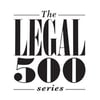A track record that speaks for itself. Post-Grant Proceedings
Leading companies trust our highly-ranked PTAB team’s experience, technical depth, and creative lawyering for a reason: our dedicated practice produces winning results in complex IPRs, PGRs, and other post-grant proceedings.
Ahead of the curve.
With extensive experience with highly specialized proceedings, we consistently deliver for our clients. We know why cases are won and lost before the PTAB, and have won numerous cases for petitioners and patent owners by “making new law.” Routinely winning high-stakes matters against top-tier firms, we have an unparalleled track record of success — with particular strength in trending technical areas like AI, cloud computing, medical devices, and life sciences, and a keen understanding of the latest PTAB developments.
.jpeg?width=1000&height=856&name=DSC06859_(2).jpeg)
fields a renowned litigation team, handling…PTAB inter partes reviews

particular prowess in post-grant proceedings, including IPRs, acting for petitioners and patent owners alike

Awards & Recognition
IPR & PGR Trials Instituted When Representing Petitioners

Final Written Decisions (IPR) - All Instituted Claims Unpatentable
%20-%20All%20Instituted%20Claims%20Unpatentable%2012.01.25-1.png?width=863&height=366&name=Final%20Written%20Decisions%20(IPR)%20-%20All%20Instituted%20Claims%20Unpatentable%2012.01.25-1.png)
All Claims Survived in Matters Resolved by PTAB

Institutions Denied When Representing Patent Owners

Our practice’s 37 members have extensive experience handling complex USPTO proceedings, including:
- Inter partes reviews (IPRs)
- Post-grant reviews (PGR)
- Reexaminations
- Interferences
- Parallel litigation

Patents Post-Grant Blog
Interested in inside views and news pertaining to the nation's busiest patent court? Check out Scott McKeown’s award-winning blog, which examines developments in patent litigation, including issues related to post-grant proceedings.
Why our clients “would not hesitate” to hire us again.
Wolf Greenfield’s Post-Grant Proceedings Practice features a team that’s unparalleled in its ability to pick apart technically complex cases to plot a path to success. The team quickly distills cases down to key technical issues to develop and present winning arguments.
Wolf Greenfield leverages their technical expertise, patent litigation insight and longstanding practice in front of the USPTO to provide a strong Post-Grant Proceedings Practice. While their high success rate is notable on its own, their understanding of how to utilize the practice as part of a larger litigation strategy separates them from others.
We've had tremendous success with IPRs that Wolf Greenfield has filed for us, and I would not hesitate to use Wolf Greenfield for such work in the future.
The Wolf Greenfield team has always been exceptional in all that they have done for our company. All members of the team have responded to our questions quickly yet with careful thought given to all answers.
Strong value for the expenses. Wolf Greenfield has delivered great results for us and I feel very confident in the quality of the work the team performs for us.
Post-Grant Proceedings Experience
Geotab
Persuaded the PTAB to find all claims unpatentable in IPR challenging a patent asserted by a licensing entity against our client Geotab. The patent, which pertained to a vehicle tracking unit with downloadable codes and associated methods, had been asserted and previously survived invalidity challenges in eight district court actions--including two jury trials, a multimillion dollar damages verdict, and three Federal Circuit appeals--as well as five ex parte reexaminations, including two ex parte appeals where the PTAB, citing secondary considerations, had reversed the examiner’s claim rejections (IPR2023-00504).
Inari Agriculture
Persuaded the Patent Trial & Appeal Board (PTAB) to institute post grant review to analyze complex issues of enablement and written description by successfully leveraging the Supreme Court's landmark decision in Amgen v. Sanofi. (PGR2023-0022)
LiTL
On behalf of client, LiTL, persuaded the PTAB to deny institution of 12 of 14 IPRs filed by Lenovo, Microsoft, HP, Dell, and ASUS. (Institution denied: IPR2024-00404; IPR2024-00454; IPR2024-00456; IPR2024-00457; IPR2024-00458; IPR2024-00480; IPR2024-00481; IPR2024-00532, IPR2021-00681, IPR2021-00786, IPR2021-00800, IPR2021-00821, IPR2021-00822). The challenged patents in these IPRs all related to computer interface technology being asserted by our client LiTL. Some of the decisions turned on claim construction issues, while others turned on the petitioner’s failures to map the claims to the prior art. Also persuaded the CRU to affirm claims challenged in two reexaminations filed by Lenovo, and persuaded the PTAB to affirm claims challenged in two additional reexaminations filed by Lenovo. (Reexam 90/015,025; Reexam 90/015,035; Reexam 90/014,958; Reexam 90/014,965).WisTa
Saved two critical patents directed to certain highly purified chemical compositions for our client WisTa, even though the European counterparts were successfully challenged by the same party. (Confirmation of all claims: IPR2018-00182 and IPR2018-00323).SolarFlare (now part of Xilinx)
Persuaded PTAB to deny institution on two unrelated patents being asserted in litigation by our client Solarflare related to sophisticated networking technology. Denials of institution on both petitions gutted the defendants’ stay strategy, and the litigation settled within weeks on terms favorable to SolarFlare. (IPR2016-01832, IPR2016-01908).Nuance
Successfully defended all claims of patent on medical record technology challenged by a competitor, with the result upheld on appeal to the Federal Circuit. (Confirmation of all claims: IPR2018-01355, IPR2019-00210).Enleofen, Boehringer Ingelheim and patent owners Singapore Health Services and the National University of Singapore
Successfully defended patent on groundbreaking fibrosis treatment by convincing the PTAB to deny institution of PGR filed by competitor because the petitioner failed to meet the threshold showing that any claim is likely unpatentable based on lack of written description, non-enablement or obviousness. (Institution denied: PGR2019-00053).University of Maryland
Saved a valuable patent by demonstrating petitioner failed to show lack of written description and lack of enablement for “tagged proteins” used to treat cancer, and therefore challenged patent antedated the purported prior art references. (Institution denied: IPR2020-00233).Saint-Gobain
Won confirmation of all claims in a patent owned by our client Saint-Gobain—marking a rare instance of a patent surviving an America Invents Act review entirely unscathed. We convinced the PTAB to reverse its initial view that the claims were likely invalid by showing that Saint-Gobain’s significant commercial success was tied to the patented invention. This was the first time the PTAB found claims patentable in an IPR based on secondary or objective factors. (Confirmation of all claims: IPR2014-00309).Cold Spring Harbor Laboratory
Convinced the PTAB not to institute four IPRs on four separate patents on behalf of our client Cold Spring Harbor Laboratory. The outcome preserved CSHL’s robust and widely licensed shRNA patent portfolio, which has generated more than $1 million in licensing revenue for the client. (Institution denied: IPR2016-00014, IPR2016-00015, IPR2016-00016, IPR2016-00017).Google and LG
Successfully invalidated all challenged claims in two patents on instant messaging technology asserted by Zipit Wireless. (IPR2019-01567, IPR2019-01568).Sony
Obtained institution on all challenged claims directed to non-magnetic tape technology, then defeated rival Fujifilm’s non-contingent motion to amend the claims. All challenged claims were successfully proven unpatentable. (IPR2017-00809).RPX
Filed three petitions for IPRs against a patent asserted by a non-practicing entity against 29 large technology companies. The petition exposed a fatal defect in patent’s priority claim and led to dismissal of all lawsuits and disclaimer of the patent. (IPR2017-00208, IPR2017-00209, IPR2017-00212).Epizyme
Successfully challenged key patents to pharmaceutical compounds and methods of treating non-Hodgkin’s lymphoma leading to cancellation of all challenged claims. (IPR2020-00327, IPR2020-00328, IPR2020-01577).RPX
Persuaded the PTAB to grant a motion for sanctions and subsequently a motion for attorneys’ fees filed by our client RPX Corporation, a leading provider of patent risk solutions, in three IPRs. The PTAB held that sanctions, rarely granted, were appropriate in this case since the patent owner violated a protective order in its handling of RPX’s confidential information. (Three petitions instituted on all grounds: IPR2015-01750, IPR2015-01751, IPR2015-01752).RPX
Filed a petition on behalf of RPX Corporation that led the patent owner to disclaim its patent before the PTAB could institute a trial. An exceedingly small number of patent owners disclaim their patents before institution, making this a rare occurrence and complete victory for our client. (All patent claims cancelled: IPR2015-00736).Sony
While defending Sony in a complex multi-respondent action before the International Trade Commission, filed IPR petitions against all three asserted patents. Our concerted attack on the patents before the ITC and in the Patent Office led the patent owner to drop the suit entirely less than two weeks before the ITC hearing was set to begin. Sony reached a favorable settlement that included withdrawal of its IPR petitions. (Favorable settlement: IPR2014-00230, IPR2014-00231, IPR2014-00229).Bard
Led multi-firm effort to overcome rejections in reexamination of a medical device patent owned by C. R. Bard, Inc. on which there was an outstanding judgment in excess of $1 billion. Developed strategy that resulted in immediate withdrawal of the rejections and secured the judgment.Nuance
Represented patent owner Nuance Communications, Inc. in nine reexamination proceedings arising from two different parallel litigations. All nine were resolved with all claims confirmed.Ascion
Won final cancellation of all original claims and rejection of all added claims, ending the patent portion of a dispute between our client and a vendor. Related Litigation: Ascion LLC v. Ruoey Lung Enterprise Corp.Cooper v. Goldfarb
Won the longest-running patent interference in USPTO history, prevailing in three Board of Patent Appeals and Interferences decisions and two Federal Circuit appeals. The resulting patent issued in 2002 and has been litigated with success.Precision Biosciences
Successfully defended nine Precision BioSciences patents relating to CAR-T cell cancer immunotherapy in interferences by Cellectis.Regents of the University of California v. University of Iowa Research Foundation. Won a dismissal that not only preserved our client’s valuable patent rights, but also significantly expanded the existing law and provided additional protection to all patent holders by restricting the ability of patent applicants to provoke an interference against an issued patent.
Raz v. Krieg
Represented the prevailing inventor in two related patent interferences. In the first, we prevailed in the preliminary motions period, and the other side appealed and then abandoned the appeal. In the second, the other side conceded and requested that judgment be entered in our favor.Adimab v. Dyax
Invalidated Adimab's patent and removed an anticipatory reference as prior art by proving 11 months of diligence for Dyax. Resulted in Dyax obtaining a patent originally granted to a top competitor. Such successful long diligence showings are very rare.Bestfoods v. Barber Foods
Developed a strategy that caused the patentee to concede the interference, resulting in a former collaborator’s patent being cancelled and allowing our client to obtain a patent on that subject matter.Medytox, Inc.
Persuaded the PTAB to deny two Inter Partes Review petitions at the institution stage on patents related to methods of treating facial wrinkles using animal-protein-free botulinum toxin compositions. We convinced the Board that the petitioner failed to properly demonstrate that the prior art reference relied upon satisfied a particular provision of the challenged claims. (IPR2021-01203, IPR2021-01204).BTG (now part of Boston Scientific)
Convinced the PTAB not to institute an IPR on behalf of our longtime client BTG International Inc., the manufacturer of CroFab® rattlesnake antivenom, preserving BTG’s right under a settlement agreement regarding an ITC litigation to prevent a competitor antivenom product from infringing its patent. (Institution denied: IPR2014-01269, IPR2015-01305).Smith & Nephew
Filed 16 petitions challenging 162 claims across several orthopedic surgery device patents asserted by rival Arthrex and achieved a perfect institution record on 16 out of 16 petitions for IPR on 162 of 162 claims. In the parallel litigation, our IPRs and related litigation arguments forced Arthrex to narrow 13 patent case down to 2 patents. (IPR2016-00483, IPR2016-00484, IPR2016-00485, IPR2016-00486, IPR2016-00487, IPR2016-00505, IPR2016-00506, IPR2016-00507, IPR2016-00508, IPR2016-00817, IPR2016-00818, IPR2016-00819, IPR2016-00854, IPR2016-00917, IPR2016-00918, IPR2017-00275).Landers v. Sapolsky
Prevailed on behalf of the Massachusetts Institute of Technology on §112 grounds, as Sapolsky’s claims were not supported because they were broader in scope than the method disclosed in the specification.The University of Texas and TissueGen
Persuaded the PTAB to deny institution of a patent related to stent systems on behalf of The University of Texas and TissueGen. The patent at issue was also being asserted by our clients in a co-pending district court litigation that had progressed to an advanced stage. We convinced the Board that proceeding with a PTAB trial was an inefficient use of Board resources and was not an effective alternative to a district court litigation. Saving the patent later helped our clients secure a $42M verdict against medical device giant, Boston Scientific. (IPR2019-00406).
On behalf of Google, we filed petitions against three patents that Boccone had asserted against LG and Samsung. The challenged claims were excessively long—spanning more than ten columns—which presented both substantive and practical challenges. The Wolf Greenfield team overcame those challenges, and developed strong unpatentability grounds. Rather than respond substantively to Google’s petitions, Boccone opted not to file a patent owner preliminary response. The Board subsequently instituted IPR against all challenged claims, and Boccone then disclaimed all challenged claims rather than defend the claims during trial. The end result was adverse judgment entered against Boccone, and soon thereafter dismissal of the underlying litigations. (IPR2020-00849, IPR2020-00850, IPR2020-00851)
Humatics
On behalf of Humatics, we filed petitions against three patents that Metrom asserted against Humatics in underlying litigation. In response to the petitions, Metrom opted to file a statutory disclaimer, rather than respond. Metrom’s decision resulted in dismissal of those three patents from the underlying litigation prior to Humatics even answering the complaint thereby saving Humatics significant litigation expenses. (IPR2023-00460, IPR2023-00452, and IPR2023-00439)
Nimble (The Data Company Technologies Inc.)
Achieved two victories on behalf of Nimble (The Data Company Technologies Inc.) in IPR proceedings before the Patent Trial and Appeal Board (PTAB). We filed the IPRs on Nimble’s behalf against patents that had previously been asserted against other companies in the Eastern District of Texas. Successfully argued that all challenged claims are unpatentable over the prior art. The patent owner, Bright Data Ltd., has appealed. (IPR2022-00135, IPR2022-00138).
Medytox, Inc.
We secured a victory for our client Medytox Inc. when the Board denied institution of inter partes review requested by Hugel Inc. The challenged patent relates to a method of purifying a particular complex – called the “macro complex” - of botulinum toxin. The Board agreed with our team on both grounds of obviousness asserted in the Petition; with respect to ground 1, that Petitioner failed to explain how the cited references disclosed isolation of the claimed “macro complex;” and with respect to ground 2, the Board exercised its discretion to deny institution under § 325(d), finding that Petitioner mischaracterized both the nature of the data in an inventor Declaration submitted during prosecution, as well as the basis for the Examiner’s determination of its “criticality.” (IPR2023-00604)
Persuaded the Patent Trial and Appeal Board (PTAB) that all claims in a patent asserted by an NPE against our client Google were unpatentable. This simplified Google's defense in parallel litigation involving multiple patent assertions. Patent owner purchased the patent from HP, which had obtained the patent in connection with its work as a market leader in enterprise servers. We demonstrated that priority was limited to the challenged patent's filing date, and that HP's own earlier patent publication, with a reference on virtual machine technology, rendered all claims obvious (IPR2022-01406).
News & Insights
A Look Ahead: Key Intellectual Property Legal Developments in 2025—and What to Expect in 2026
This past year saw major shifts affecting patent adjudication, prosecution strategy, biotechnology claiming, artificial intelligence, standard-essential patents, and litigation trends. Moving into 202...

Scott McKeown Quoted by Bloomberg Law on USPTO Patent Rule Changes
Scott McKeown was quoted by Bloomberg Law in an article titled “Patent Office Moves to Limit Validity Challenges at Board.” In this article, Scott discusses the sweeping impact of the USPTO’s proposed...

Wolf Greenfield Named Top IPR Law Firm for Ninth Consecutive Year
Wolf Greenfield has once again been named a top inter partes review (IPR) law firm by Patexia’s annual IPR Intelligence Report—marking the firm’s ninth consecutive year of recognition for its outstand...

Events
Upcoming Events
2026 PTAB Bar Association Annual Conference
Past Events
IPWatchdog: PTAB Masters™ 2026
Comparative Patent Practice Conference: EP/US Comparative IP Law Seminar 2025
Contact






